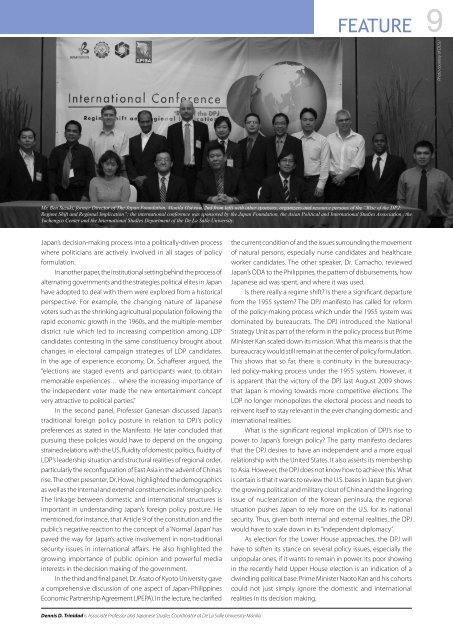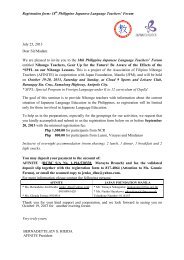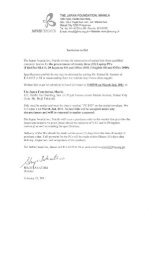In this Issue - The Japan Foundation, Manila
In this Issue - The Japan Foundation, Manila
In this Issue - The Japan Foundation, Manila
Create successful ePaper yourself
Turn your PDF publications into a flip-book with our unique Google optimized e-Paper software.
FEATURE<br />
9<br />
Photo courtesy of DLSU<br />
Mr. Ben Suzuki, former Director of <strong>The</strong> <strong>Japan</strong> <strong>Foundation</strong>, <strong>Manila</strong> (1st row, 2nd from left) with other sponsors, organizers and resource persons of the “Rise of the DPJ:<br />
Regime Shift and Regional Implication”; the international conference was sponsored by the <strong>Japan</strong> <strong>Foundation</strong>, the Asian Political and <strong>In</strong>ternational Studies Association , the<br />
Yuchengco Center and the <strong>In</strong>ternational Studies Department of the De La Salle University.<br />
<strong>Japan</strong>’s decision-making process into a politically-driven process<br />
where politicians are actively involved in all stages of policy<br />
formulation.<br />
<strong>In</strong> another paper, the institutional setting behind the process of<br />
alternating governments and the strategies political elites in <strong>Japan</strong><br />
have adopted to deal with them were explored from a historical<br />
perspective. For example, the changing nature of <strong>Japan</strong>ese<br />
voters such as the shrinking agricultural population following the<br />
rapid economic growth in the 1960s, and the multiple-member<br />
district rule which led to increasing competition among LDP<br />
candidates contesting in the same constituency brought about<br />
changes in electoral campaign strategies of LDP candidates.<br />
<strong>In</strong> the age of experience economy, Dr. Schafferer argued, the<br />
“elections are staged events and participants want to obtain<br />
memorable experiences… where the increasing importance of<br />
the independent voter made the new entertainment concept<br />
very attractive to political parties.”<br />
<strong>In</strong> the second panel, Professor Ganesan discussed <strong>Japan</strong>’s<br />
traditional foreign policy posture in relation to DPJ’s policy<br />
preferences as stated in the Manifesto. He later concluded that<br />
pursuing these policies would have to depend on the ongoing<br />
strained relations with the US, fluidity of domestic politics, fluidity of<br />
LDP’s leadership situation and structural realities of regional order,<br />
particularly the reconfiguration of East Asia in the advent of China’s<br />
rise. <strong>The</strong> other presenter, Dr. Howe, highlighted the demographics<br />
as well as the internal and external constituencies in foreign policy.<br />
<strong>The</strong> linkage between domestic and international structures is<br />
important in understanding <strong>Japan</strong>’s foreign policy posture. He<br />
mentioned, for instance, that Article 9 of the constitution and the<br />
public’s negative reaction to the concept of a ‘Normal <strong>Japan</strong>’ has<br />
paved the way for <strong>Japan</strong>’s active involvement in non-traditional<br />
security issues in international affairs. He also highlighted the<br />
growing importance of public opinion and powerful media<br />
interests in the decision making of the government.<br />
<strong>In</strong> the third and final panel, Dr. Asato of Kyoto University gave<br />
a comprehensive discussion of one aspect of <strong>Japan</strong>-Philippines<br />
Economic Partnership Agreement (JPEPA). <strong>In</strong> the lecture, he clarified<br />
the current condition of and the issues surrounding the movement<br />
of natural persons, especially nurse candidates and healthcare<br />
worker candidates. <strong>The</strong> other speaker, Dr. Camacho, reviewed<br />
<strong>Japan</strong>’s ODA to the Philippines, the pattern of disbursements, how<br />
<strong>Japan</strong>ese aid was spent, and where it was used.<br />
Is there really a regime shift Is there a significant departure<br />
from the 1955 system <strong>The</strong> DPJ manifesto has called for reform<br />
of the policy-making process which under the 1955 system was<br />
dominated by bureaucrats. <strong>The</strong> DPJ introduced the National<br />
Strategy Unit as part of the reform in the policy process but Prime<br />
Minister Kan scaled down its mission. What <strong>this</strong> means is that the<br />
bureaucracy would still remain at the center of policy formulation.<br />
This shows that so far, there is continuity in the bureaucracyled<br />
policy-making process under the 1955 system. However, it<br />
is apparent that the victory of the DPJ last August 2009 shows<br />
that <strong>Japan</strong> is moving towards more competitive elections. <strong>The</strong><br />
LDP no longer monopolizes the electoral process and needs to<br />
reinvent itself to stay relevant in the ever changing domestic and<br />
international realities.<br />
What is the significant regional implication of DPJ’s rise to<br />
power to <strong>Japan</strong>’s foreign policy <strong>The</strong> party manifesto declares<br />
that the DPJ desires to have an independent and a more equal<br />
relationship with the United States. It also asserts its membership<br />
to Asia. However, the DPJ does not know how to achieve <strong>this</strong>. What<br />
is certain is that it wants to review the U.S. bases in <strong>Japan</strong> but given<br />
the growing political and military clout of China and the lingering<br />
issue of nuclearization of the Korean peninsula, the regional<br />
situation pushes <strong>Japan</strong> to rely more on the U.S. for its national<br />
security. Thus, given both internal and external realities, the DPJ<br />
would have to scale down in its “independent diplomacy”.<br />
As election for the Lower House approaches, the DPJ will<br />
have to soften its stance on several policy issues, especially the<br />
unpopular ones, if it wants to remain in power. Its poor showing<br />
in the recently held Upper House election is an indication of a<br />
dwindling political base. Prime Minister Naoto Kan and his cohorts<br />
could not just simply ignore the domestic and international<br />
realities in its decision making.<br />
Dennis D. Trinidad is Associate Professor and <strong>Japan</strong>ese Studies Coordinator at De La Salle University-<strong>Manila</strong>.
















